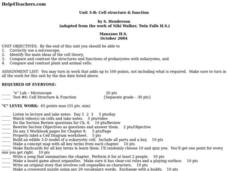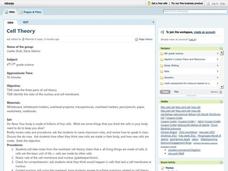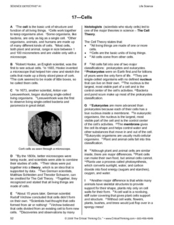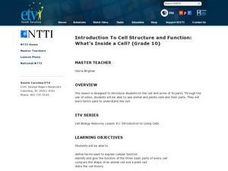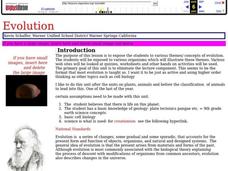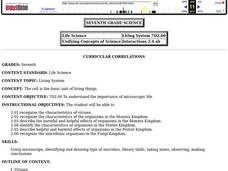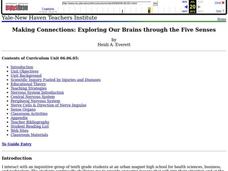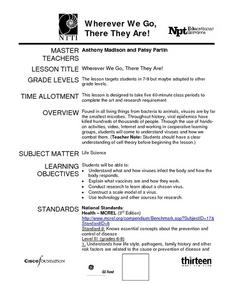Columbus City Schools
Cell-abrate!
Lights, camera, action! With the cell at center stage, guide your seventh grade biologists through the tiny drama that plays out within every living thing. Then, enjoy the show as they portray the organelles they've studied—a performance...
Columbus City Schools
Let’s Get Theoretical About Cells
Get up close and personal with cells in a hands-on journey to discover what makes up living things. Scholars learn valuable microscope skills, delve into the Modern Cell Theory, and gain insight into how cells reproduce. The included lab...
Curated OER
Early Scientists' Contributions
Five scientists and their contributions to modern cell theory are listed, one person per slide. It concludes by having viewers answer recap questions. This simple presentation can be used on the first day of your unit on cells to...
Curated OER
Unit 3 Cell Structures: Cell Theory & Organelles
Students examine cell structures in depth. They decide what grade they want to work for and do the assignments for that grade. They complete various assignments on cell theory and organelles.
Biology Corner
Cell Theory Rap
All that this will link you to is a rap about cell theory and organelles. Use it as an example for a creative assignment in your biology class. Divide the class into groups and assign them a topic for which they write and perform a skit,...
Curated OER
Cell Theory, Scientists, & Cell Types
In this cells worksheet, students compare the characteristics of eukaryotic and prokaryotic cells. Students describe how different scientists contributed to the cell theory. This worksheet has 6 short answer questions and 1 graphic...
Odell Education
Plant and Animal Cells
Incorporate multiple facets of the cell into your next high school lab! Through an introduction to cell organelles, class members observe each cell type and draw visuals to further demonstrate understanding of cellular processes in both...
Curated OER
Structure and Function of the Cell/Introduction to the Cell
So, this is not technically a worksheet, but rather a chapter of reading material, pictures, and diagrams introducing young biologists to the cell. Cell theory, diversity, size, and shape are described. The internal organization and...
Curated OER
Understanding Cells
Students identify and define several related vocabulary terms. Students complete a short lab and complete the questions. Students create a cell crossword puzzle and play cell computer games through the included links.
Curated OER
Chapter Seven: Cell People and More Notes
Who were the key players in cell theory? Use a handout to help young biologists record the basics about cell theorists and cell types. It refers to chapter seven of a textbook, but does not include the name of the textbook.
Curated OER
Cell Structure and Function
Students identify the main ideas of different cell theories. Using a microscope, they compare and contrast the structures and functions of prokaryotes and eukaryotes. They also compare and contrast animal and plant cells and complete...
Curated OER
Cell Theory
Students state the three parts of cell theory. They identify the roles of the nucleus and cell membrane. They take notes from the overhead on cell theory. They answer true/false questions about cell theory.
Pace University
Grade 6-8 Living Things
What characterizes a living thing? Scholars explore the concept during a differentiated instruction unit on living things. They perform lab experiments to determine how animals adapt to stimuli, watch videos and learn about...
Curated OER
17 - Cells
The first of three pages in this handout provides a brief history of our understanding of the cell. It also differentiates between prokaryotic and eukaryotic cells. The second is a collection of true and false, multiple choice, and short...
Curated OER
WHAT IS A CELL?
Young scholars explore the function and structures of cells, including plant and animal cells. They explore cell parts including cell wall, ribosomes, chromosomes, nucleoid, plasmids, flagella, pilli, and plasma membrane, cel
Curated OER
Cell Theory, Plant And Animal Cell Comparison
Tenth graders study plant and animal cells. In this investigative instructional activity students draw their own animal cells and label them.
Curated OER
Introduction To Cell Structure and Function: What's Inside a Cell?
Tenth graders are introduced to the cell and some of its parts. Through the use of video, 10th graders see animal and plants cells and their parts. They learn terms used to explain the cell.
Curated OER
Gaia: The Wisdom of the Earth
Learners are introduced to Gaia theory of natural homeostasis. They graph Earth's temperatures over time, construct terrariums or monitor the outdoor environment. Related videos titles are suggested, but may be outdated. The objectives...
Curated OER
Evolution
Explore the concept of evolution and cell biology; your class can work in groups to use the internet to view websites on evolution, take a quiz, and complete a lab activity.
Curated OER
Cells
Seventh graders look up pictures of viruses or pictures of models of viruses. Using pipe cleaners, beads, Styrofoam or other available materials make models of these shapes. They then observe a demonstration to show the effect of Tobacco...
Core Knowledge Foundation
Genetics and the Master Race
How did the beginnings of genetic research influence the Nazi party? A thorough, engaging unit incorporates the work of Gregor Mendel, the study of inherited traits, and the use of racism and discrimination during the Holocaust.
Curated OER
Making Connections: Exploring Our Brains through the Five Senses
Students identify structures of the brain, and neurons and analyze their functions. In this nervous system lesson plan students create drawings and models of anatomy.
Curated OER
Wherever We Go, There They Are!
The central video for this lesson is not available through the included resource link. However, the activity that simulates the passing of a virus through a population is impacting and the other resource links are invaluable. Use this...
Curated OER
Gumdrop Crystal Models
A great way to learn about molecular structures is to make a model. Gumdrops and toothpicks are used to construct crystal models. The models are based on theories of crystal shapes that occur because of positive and or negatively charged...












